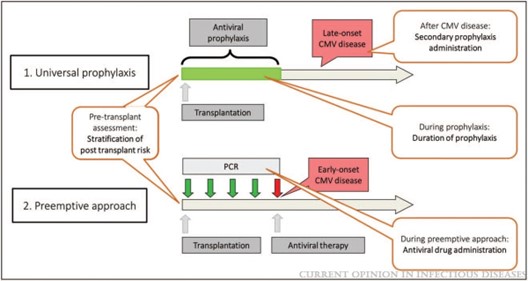- Accueil
- Research
- Group leaders
- Prof. Oriol MANUEL
- CMV after organ transplantation
Prof. Oriol Manuel
Professeur associé
Médecin adjoint
Service des maladies infectieuses
Université de Lausanne (UNIL)
CHUV
BH10/549
Rue du Bugnon 46
1011 Lausanne, Suisse
CMV after organ transplantation
CMV infection is associated with a significant burden of disease in SOT recipients. We have published on the epidemiology, prevention strategies, and outcomes of CMV infection in this population. Over the last 10 years, we have focused our research on quantifying the burden of CMV disease and on using biomarkers for personalizing preventive strategies against CMV infection [1].
We showed in one of the largest cohorts of SOT recipients that patients on antiviral prophylaxis had better patient and allograft outcomes that those managed by a preemptive approach [2]. The benefit of the use of antiviral prophylaxis was observed not only for preventing CMV, but also for all other herpesvirus infections [3].
We also showed that a novel assay measuring the specific T-cell-mediated immune response to CMV could appropriately stratify the risk for subsequently developing CMV disease [4]. We have recently evaluated in a multicenter randomized clinical trial the utility of measuring CMV-specific cellular immunity (T-Track-CMV) as a tool to determine the duration of antiviral prophylaxis in CMV high-risk SOT recipients. We have shown that, in patients monitored with the T-Track-CMV assay, we were able to reduce the duration of antiviral prophylaxis without carrying a higher risk for CMV events [5]. We are currently assessing the feasibility of the implementation of a CMV cell-mediated immune assay in the routine clinical practice.
Our group actively participates on the EU-funded HORUS consortium (https://www.horus-project.eu/), a European-wide multidisciplinary clinical, translational, and basic research endeavor for improving our understanding of CMV/host interactions in the context of immunosuppression.

Selected publications
Bestard O, Kaminski H, Couzi L, Fernández-Ruiz M, Manuel O. Cytomegalovirus Cell-Mediated Immunity: Ready for Routine Use? Transpl Int. 2023 Nov 7;36:11963. doi: 10.3389/ti.2023.11963. PMID: 38020746. View article
Manuel O, Kralidis G, Mueller NJ, Hirsch HH, Garzoni C, van Delden C, Berger C, Boggian K, Cusini A, Koller MT, Weisser M, Pascual M, Meylan PR; Swiss Transplant Cohort Study. Am J Transplant. 2013; 13: 2402-10. View article
Martin-Gandul C, Stampf S, Héquet D, Mueller NJ, Cusini A, van Delden C, Khanna N, Boggian K, Hirzel C, Soccal P, Hirsch HH, Pascual M, Meylan P, Manuel O, Swiss Transplant Cohort Study (STCS). Am J Transplant 2017; 17:1813-1822.. PMID: 28039960. View article
Manuel O, Husain S, Kumar D, Zayas C, Mawhorter S, Levi ME, Kalpoe J, Lisboa L, Ely L, Kaul DR, Schwartz BS, Morris MI, Ison MG, Yen-Lieberman B, Sebastian A, Assi M, Humar A. Clin Infect Dis. 2013 Mar;56(6):817-24. doi: 10.1093/cid/cis993. Epub 2012 Nov 29. PMID: 23196955. View article
Manuel O, Laager M, Hirzel C, Neofytos D, Walti LN, Hoenger G, Binet I, Schnyder A, Stampf S, Koller M, Mombelli M, Kim MJ, Hoffmann M, Koenig K, Hess C, Burgener AV, Cippà PE, Hübel K, Mueller TF, Sidler D, Dahdal S, Suter-Riniker F, Villard J, Zbinden A, Pantaleo G, Semmo N, Hadaya K, Enríquez N, Meylan PR, Froissart M, Golshayan D, Fehr T, Huynh-Do U, Pascual M, van Delden C, Hirsch HH, Jüni P, Mueller NJ; Swiss Transplant Cohort Study (STCS). Clin Infect Dis. 2024 Feb 17;78(2):312-323. doi: 10.1093/cid/ciad575. PMID: 37738676. View article
Team
- Sophie Seydoux, MD student
- Valérie Sormani, RN
Open positions
- No current position available



